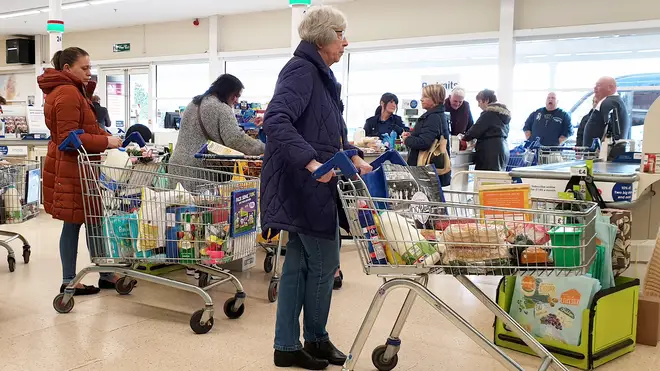
Ben Kentish 10pm - 1am
11 December 2020, 01:04

Shoppers will be hit with price increases as supermarkets deal with a £3.1 billion tariff on food and drink if the UK fails to secure a last-minute Brexit deal, business groups have warned.
Supermarket chains will face import taxes on goods imported from the EU, which are expected to particularly impact fresh food, such as fruit and vegetables.
While retailers may swallow some of the impact, it is understood grocers intend to increase prices on everyday shopping items to mitigate the impact in a no-deal scenario.
The British Retail Consortium (BRC) said that 85% of foods imported from the EU are expected to face tariffs of more than 5%.
Read more: EU leaders meet as 'gloomy' Brexit talks hang in the balance
Read more: Congestion at UK ports 'out of control' ahead of Brexit
Chairman of Tesco John Allan warned that food bills for his shoppers could climb by 5% in the event of a no-deal scenario if a Brexit deal is not struck.
If Britain leaves the EU without a deal, new tariff rules are set to be implemented from January 1.
The BRC said this would result in an average tariff of more-than-20% on food imported from the EU, including 48% on beef mince, 16% on cucumbers, 10% on lettuce and 9% on tomatoes.

Cargo director warns congestion will get worse at ports with Brexit
The Food Foundation found that, if tariff increases are passed directly on to UK consumers, the average British family would pay 4% more for their fruit and vegetables from the start of next year.
Andrew Opie, the BRC's director of food and sustainability, said: "With just weeks to go, it is alarming that there has still been no deal agreed with the EU, putting customers in line for a £3 billion tariff bombshell.
"Currently, four-fifths of UK food imports come from the EU and without a tariff-free deal, supermarkets and their customers face over £3 billion in tariffs from 2021.
"Retailers are doing everything they can in time for January 1 but no amount of preparation for retailers can entirely prevent disruption to food and other essential goods that come from or through the EU.
Read more: UK 'won't give up on basic points of democratic principle' over Brexit
Read more: EU lays out contingency measures in the event of no-deal Brexit
"With negotiations entering the eleventh hour, protecting UK and EU consumers from billions in tariffs must be the top priority."
A survey by the Association for Convenience Stores (ACS) revealed that retailers' biggest concern regarding impact was the potential effect on pricing.
Around 41% of retailers surveyed said they were most concerned about increased prices of products when the UK exits the EU next month.
Drinks are also expected to be particularly impacted by the tariff rules, with beverages making up 43% of all groceries imported from the EU.

Theo Usherwood latest Brexit news
In September, wine merchants warned the All Party Parliamentary Group for Wine and Spirits that they expect a £70 million tariff bill which could push up the price of Rioja, Bordeaux, Prosecco and other imported drinks.
Supermarkets have increased their sourcing of British produce over the past year, so that more than half of all food consumed in the UK is currently produced in the UK.
However, supermarkets will be reliant on imports of certain fruit and vegetables during the winter period.
The UK sources 85% of its tomatoes from the EU in January, falling to 30% by June.
Checks and delays at the border could also result in some of these products reaching UK customers with a shorter shelf-life
Other items such as toys and clothes could also be particularly impacted by price increases and disruption in the distribution process.
Read more: Nicola Sturgeon ‘deeply concerned’ at lack of clarity on Brexit
Read more: Brits 'could face curb on EU travel' after Brexit transition period under Covid rules
The British Toy and Hobby Association said toy manufacturers are facing a "drastic price increase" on freight due to a shortage of capacity and containers due to Brexit.
A Government spokesperson said: "As we have seen this year, the UK has a large, diverse and highly resilient food supply chain - which has coped well in responding to unprecedented challenges.
"We are in regular contact with the food industry to support its preparations for a range of scenarios, and will continue to work closely with them to ensure people across the country have the food and supplies they need."